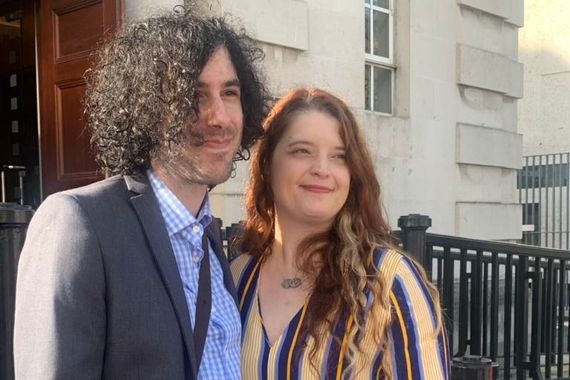Belfast court judgment that ruled people born in Northern Ireland are legally British not Irish unless they renounce their British citizenship is slammed by the Ancient Order of Hibernians.
The oldest and largest Irish-Catholic organization in the United States has slammed Monday’s judgment from a Belfast court that deemed all people born in Northern Ireland are legally British not Irish unless they renounce their British citizenship.
In a letter to Ambassador Robert Wood Johnson, United States Ambassador to the United Kingdom, the Ancient Order of Hibernians expressed their concern that the recent ruling decreed people born in Northern Ireland as legally British citizens even if they identify as Irish.
Read more: Outrage as UK court rules all born in Northern Ireland are British, not Irish
In a statement, the AOH wrote that they believe this ruling undermines one of the core elements of the Good Friday Agreement and represents yet another failure of the British government to take accountability for its obligations under that historic treaty.

US Ambassador to Britain Woody Johnson leaves 10 Downing Street after US Secretary Of State, Rex Tillerson meet Prime Minister Theresa May on January 22, 2018 in London, England. (Photo by Dan Kitwood/Getty Images)
The case involved Emma DeSouza, from Magherafelt, Co Derry, who applied for a residence card for Northern Ireland for her US-born husband Jake. She identified herself as an Irish citizen.
The British Home Office -rejected the application stating it considered her British because she was born in Northern Ireland. They told her to reapply under British citizenship or take up Irish citizenship and renounce her British citizenship.
She made clear that she never considered herself British, so how she asked could she renounce citizenship she never had?
She won her first appeal but the Home Office appealed to a higher court based in Belfast and won.
DeSouza vowed to fight on stating everyone in Northern Ireland had the right to their own identity.
The Hibernians joined with the Irish government in criticizing the judgement, asking Ambassador Johnson, as the diplomatic representative of a guarantor of the Good Friday Agreement, to formally ask the British government for an explanation for this failure to enact this key tenet of the Good Friday Agreement and for a timeline of when, after over two decades, the United Kingdom will finally fulfill this and other commitments under the Good Friday Agreement.

Jame and Emma DeSouza.
The full letter states: “National Identity has been the pivotal issue of Northern Ireland’s turbulent history, and nowhere more so than in the thirty-year conflict known as “the Troubles.”
One of the significant breakthroughs of the Good Friday Agreement brokered by U. S. Special Envoy Georg Mitchell was to acknowledge the complexities of identity in Northern Ireland, and by respecting it, remove it as a cause of conflict. The recent ruling by a UK court in the DeSouza case that people born in Northern Ireland are exclusively British citizens destabilizes the Good Friday Agreement and the two decades of peace which have been built upon it by removing one of its core foundation stones.
“The Good Friday agreement signed by Britain clearly states ‘(the United Kingdom and Ireland) will recognize the birthright of all the people of Northern Ireland to identify themselves and be accepted as Irish or British, or both, as they may so choose, and accordingly confirm that their right to hold both British and Irish citizenship is accepted by both Governments and would not be affected by any future change in the status of Northern Ireland.’
Read more: Derry woman says US husband is being held hostage over her “Irish” status
“It defies belief that after two decades, the British courts have found there is nothing in British legislation “giving effect” to the pledges made twenty-one years ago by the United Kingdom under the Good Friday Agreement, an internationally recognized treaty.
“The failure by the U.K. to recognize the birthright of the people of Northern Ireland to choose their national identity strikes at the foundation of the Good Friday Agreement. It is yet another dereliction of Britain’s duty as a signatory of the agreement and adds to the growing and aging list of Good Friday Agreement delinquencies: failure to address the legacy issues of “the Troubles”, failure to implement a Bill of Rights for Ireland, failure to give even marginal support to the principle of “parity of esteem” by implementing an innocuous Irish language act.
“Over two decades ago, the United States achieved what was thought to be diplomatically impossible; to bring the seemingly irreconcilable factions of one of the most violent conflicts in history together to sign the Good Friday Agreement and chart a new course for peace. The United States can be rightfully proud of its role in framing an agreement that has become a beacon of hope for the power of diplomacy to triumph over internecine conflict. The continued failures of the British government to take concrete steps to fulfill its pledged commitments under the Good Friday Agreement threatens America’s diplomatic legacy and credibility as a guarantor of the agreement.
“The Hibernians respectfully request Ambassador Johnson, for you to lodge a formal inquiry with the British government as to why after two decades Britain’s obligation to recognize the right of the people of Northern Ireland to identify as Irish and other commitments made under the Good Friday Agreement is yet to be a fulfilled. Additionally, as the official representative of a guarantor of the Good Friday Agreement, we request that you ask the British government for a timeline for when, after twenty-one years, Britain will fulfill all its pledged commitments under Good Friday Agreement.”
What do you think of the result of the case? Let us know in the comments section, below.




Comments